Female Prisoner Scorpion: #701's Grudge Song Blu-ray Movie
HomeFemale Prisoner Scorpion: #701's Grudge Song Blu-ray Movie 
Blu-ray + DVDArrow | 1973 | 88 min | Not rated | No Release Date

Price
Movie rating
6.4 | / 10 |
Blu-ray rating
| Users | 0.0 | |
| Reviewer | 2.0 | |
| Overall | 2.0 |
Overview
Female Prisoner Scorpion: #701's Grudge Song (1973)
Once again on the lam, Matsu is helped by a strip club worker who holds a grudge against the detective who's trying to find her.
Starring: Meiko Kaji, Masakazu Tamura, Yayoi Watanabe, Sanae Nakahara, Akemi NegishiDirector: Yasuharu Hasebe
| Foreign | Uncertain |
| Drama | Uncertain |
| Crime | Uncertain |
| Thriller | Uncertain |
Specifications
Video
Video codec: MPEG-4 AVC
Video resolution: 1080p
Aspect ratio: 2.39:1
Original aspect ratio: 2.39:1
Audio
Japanese: LPCM Mono (48kHz, 24-bit)
Subtitles
English
Discs
Blu-ray Disc
Two-disc set (1 BD, 1 DVD)
DVD copy
Playback
Region A (B, C untested)
Review
Rating summary
| Movie | 2.0 | |
| Video | 2.0 | |
| Audio | 3.0 | |
| Extras | 3.0 | |
| Overall | 2.0 |
Female Prisoner Scorpion: #701's Grudge Song Blu-ray Movie Review
Reviewed by Jeffrey Kauffman August 13, 2016Note: This film is currently available as part of the box set Female Prisoner Scorpion: The Complete Collection.
The damsel in distress has been a cinematic staple since the earliest day of the silents, when aghast audiences were horrified by the sight of
some
dastardly villain tying a helpless heroine to the railroad tracks (or something like that). Interestingly, that plot device underwent a subtle but
ultimately
kind of significant change decades later when the whole “women in prison” subgenre started cropping up. Suddenly, the damsels weren’t just in
distress, they were surrounded by leering people ostensibly in power, and they also had to suffer various indignities fostered by their fellow
inmates.
This almost fetishitic subject matter had a zenith of sorts in a series of Japanese exploitation films that began with 1972’s Female Prisoner
#701:
Scorpion, a series which appeared probably not so coincidentally just as feminism was really starting to gain a toehold globally. Featuring
Meiko
Kaji, who would go on to star in the Female Prisoner Scorpion sequels as well as the somewhat tonally
similar
The Complete Lady Snowblood, the
Female Prisoner Scorpion films are fascinating not just for their often lurid content, but also for presentational aspects that are oddly if
quite
interestingly theatrical, giving the films a bit of both the mundane and the arcane.
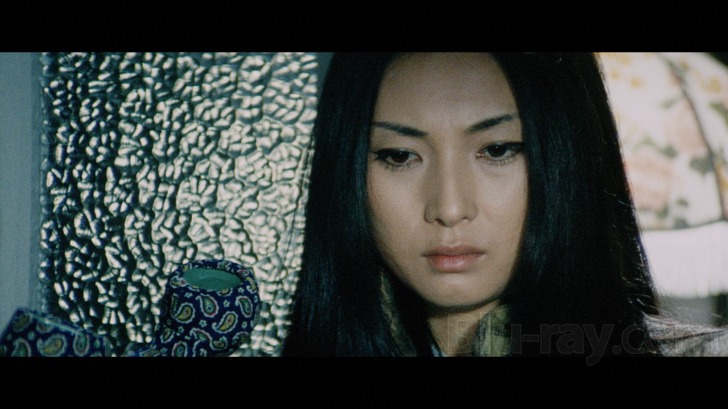
This fourth film in the franchise is the only one not directed by Shunya Ito, and the difference in style is obvious, not necessarily to the betterment of the series. This is probably the most “pedestrian” of the four films in terms of its presentational aspects, with virtually none of the weird but compelling theatricality that made the first two films especially so oddly fascinating. Nami (Meiko Kaji) is out and about as the film begins, but not for long. A wedding is interrupted by a gang of cops, and Nami is of course the target. As is virtually a given in this series, her capture is short lived, though the mechanics of this exact escape are handled a bit clumsily, with some freeze frames and quasi-montage aspects that don’t exactly clarify what’s going on. The bottom line is, Nami escapes—as she so often does.
The film segues to a strip joint (this particular entry has more than its fair share of full frontal female nudity), where a lighting guy named Kudo (Masakazu Tamura) is being teased by one of the workers for not liking girls. When she attempts to “help him”, unzipping his pants and sticking her hand inside, she suddenly recoils in horror, saying that he’s horribly “messed up” down there. That turns out to be only one of several scars Kudo is bearing, as it turns out he’s been the victim of about as much police brutality as Nami has. So. . .guess who finds Nami and starts taking care of her?
It almost—almost—looks like Nami is headed toward something like happily ever after with Kudo, despite the obvious psychological and physical traumas they have both experienced. Of course, fate intervenes in the form of more nasty cops, and this being Female Prisoner Scorpion and all, happy endings are probably not in the cards. While more literal than the other films in this series (especially the first two), there are still brief moments of near surreality here, especially in a wacky late sequence where Nami is facing the gallows. Unfortunately, it’s too late to really rescue either the film or the character, who obviously was ready to retire from her slashing vengeance activities.
Female Prisoner Scorpion: #701's Grudge Song Blu-ray Movie, Video Quality 
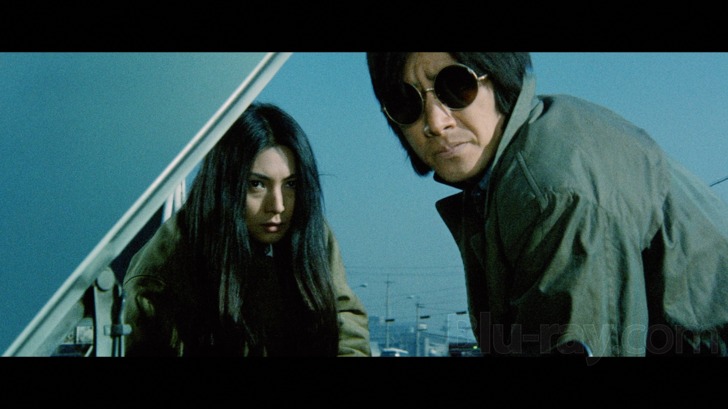
All four films in Female Prisoner Scorpion: The Complete Collection exhibit some of the same tendencies, and so I'll begin each review with some general comments about the set, including Arrow's description of the provenance of the transfers, before moving on to specific comments about each individual film. Arrow's verbiage on the transfers is as follows:
The films of the Female Prisoner Scorpion Collection have been exclusively restored in 2K resolution for this release by Arrow Films and are presented in their original theatrical aspect ratio of 2.35:1 [Note: The Blu-ray ARs are actually 2.39:1] with mono sound.In order to better understand what is on tap for the viewer in these presentations it's probably important to try to unpack what the preceding spiel "really" means. The fact that Arrow is commendably forthcoming to state that these were sourced off of low contrast 35mm prints explains one thing, but what exactly the "original 35mm film elements" were is something else entirely, and I personally suspect we're dealing with secondary source elements to begin with (if someone out there has definitive information, pass it along and I'll happily update the review). All four films exhibit "dupey" tendencies, apart and aside from problems introduced by the low contrast source. These include variable (and at times pretty problematic) grain structure, some mosquito noise intruding, especially in darker scenes, horizontal banding/clumping of grain and just a generally roughhewn appearance that often tends to defeat detail and especially fine detail levels. Dark scenes are often littered with crush, and due to the frequent skewing toward blue, blacks can often appear purplish and flesh tones often assume an almost ghastly pallor. In all four films when things venture out of doors in brighter lighting conditions, the palette improves at least incrementally, but there's really nothing here that looks vivid or, more saliently, natural. A little oddly (at least to me), considering the blue look of the films, reds and oranges often come off looking at least relatively better than some other tones.
A set of low-contrast 35mm prints struck from the original 35mm film elements were supplied by Toei Company, Ltd. These prints were scanned in 2K resolution on a pin-registered 4K Northlight Scanner. Picture grading was completed on a DaVinci Resolve and thousands of instances of dirt, debris and light scratches were removed using PFClean software. Overall image stability and instances of density fluctuation were was also improved. All restoration work was completed at Pinewood Studios.
The images on all four Female Prisoner Scorpion films favor a noticeably cyan/blue look throughout. This look was inherent in the film materials supplied and relates to how these lab materials were created, as well as how the original elements have faded over time. With these restorations, we have aimed to present the films as close to their intended original style and appearance as possible.
#701's Grudge Song exhibits just about all of the deficits I discussed in our Female Prisoner Scorpion: Beast Stable Blu-ray review, with pretty prevalent mosquito noise competing with already problematic grain, and a tendency for flesh tones to often be a really odd and ugly greenish tone (watch at around 5:30 for just one example of this tendency). The entire presentation is hobbled by the ungainly and "dupey" looking grain and the obviously low contrast roots of the source, both of which combine to offer a gritty, overly textured appearance that at times seems to almost willfully defy efforts to provide detail and/or fine detail. Interestingly, some brief black and white interstitials look like contrast is actually blown out instead of restricted, leading to some minor blooming in whites. While the unnatural looking grain is a recurrent irritant, the palette tends to look at least slightly more natural when the film ventures out of doors, which it does with some regularity.
Female Prisoner Scorpion: #701's Grudge Song Blu-ray Movie, Audio Quality 
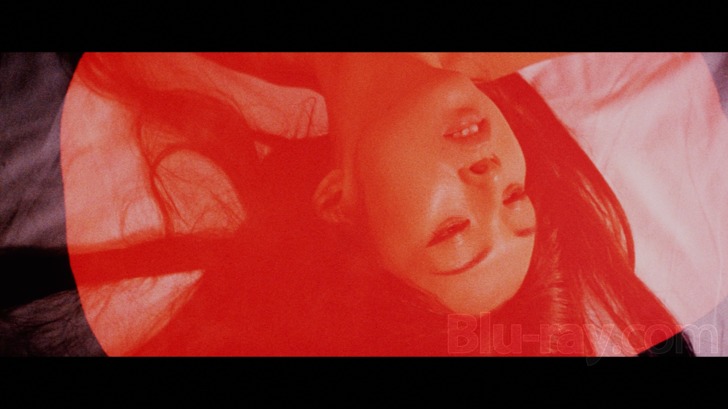
All four films feature LPCM Mono tracks in the original Japanese (with optional English subtitles). There's slight but noticeable distortion in the upper midrange, especially during cues. It's somewhat more prevalent in some of the more intense cues, especially those featuring koto (as in Jailhouse 41). #701's Grudge Song probably sounds the best of the bunch, but it's notable that the entire mix seems a little hotter on that film than on the other three. All four films deliver dialogue without much problem, and sound effects (i.e., blades slashing, bullets flying) are generally decent if not overwhelmingly powerful.
Female Prisoner Scorpion: #701's Grudge Song Blu-ray Movie, Special Features and Extras 
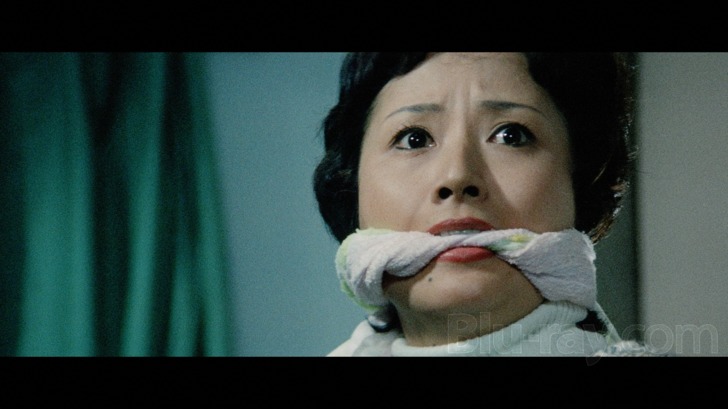
- An Appreciation by Kazuyoshi Kumakiri (1080p; 11:13) is a 2016 interview focusing on the interplay between Toie and this franchise.
- Yasuharu Hasebe: Finishing the Series (1080p; 19:49) is a 2006 interview with the director of the final film in the series.
- Jasper Sharp on Yasuharu Hasebe (1080p; 16:54) offers Sharp's 2016 ruminations on the director.
- They Call Her Scorpion: A Visual Essay by Tom Mes (1080p; 40:00) is a nice in depth look at the entire series.
- Trailer (1080p; 3:14)
- Credits (1080p; 00:55) is a list of credits since Arrow chose not to subtitle the actual credits sequence, other than the title song lyric.
Female Prisoner Scorpion: #701's Grudge Song Blu-ray Movie, Overall Score and Recommendation 
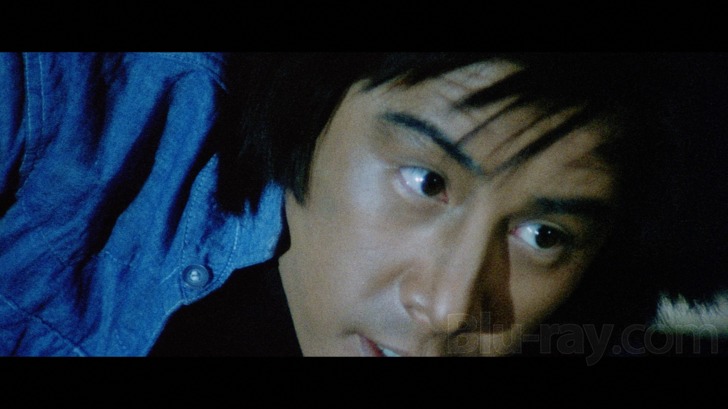
The iconography of the series and especially the Nami character was firmly in place by the time this fourth film came along, and so there's a certain "shorthand" on display where a brief shot of Nami in trenchcoat and fedora with a silvery blade in her hand is all the audience needs to see to know what's about to happen. The story here is actually kind of interesting, with two misfits attempting to find love in a world gone mad (or something like that), but #701's Grudge Song is simply too formulaic to ever work up much energy. Once again problematic video will be the biggest stumbling block for fans of the film.
Similar titles
Similar titles you might also like
(Still not reliable for this title)

Female Prisoner Scorpion: Jailhouse 41
1972

Female Prisoner Scorpion: Beast Stable
1973

Female Prisoner #701: Scorpion
1972

Rainy Dog
1997

Stray Cat Rock: Beat '71
1971

Stray Cat Rock: Machine Animal
1970

Omar
2013

Dr. Mabuse: The Gambler
Dr. Mabuse, der Spieler - Ein Bild der Zeit
1922

Lady Vengeance
Sympathy for Lady Vengeance | Ultimate Revenge Edition | 친절한 금자씨
2005

Pickpocket
1959

Stray Cat Rock: Sex Hunter
Sekkusu hantâ - sei kariudo
1970

36th Precinct
36 quai des Orfèvres
2004

Shinjuku Triad Society
1995

The Bride Wore Black
La mariée était en noir
1968

Ley Lines
1999

Baise-moi
Rape Me
2000

Bullet Ballet
バレット・バレエ
1998

Scum
1979

Le Trou
1960

Criminal Lovers
Les amants criminels
1999